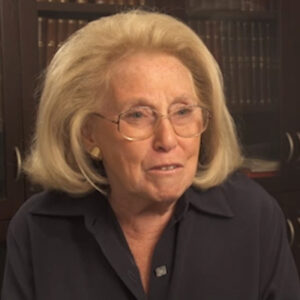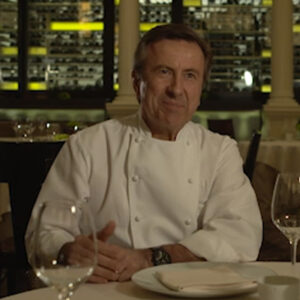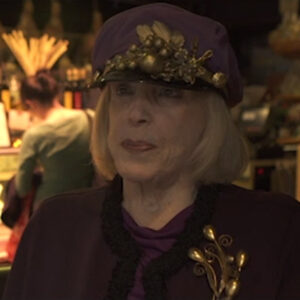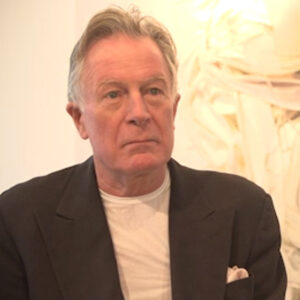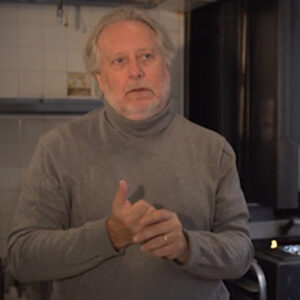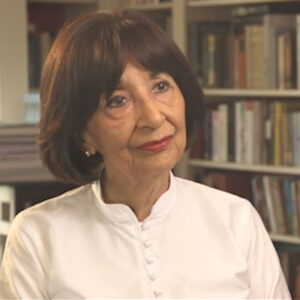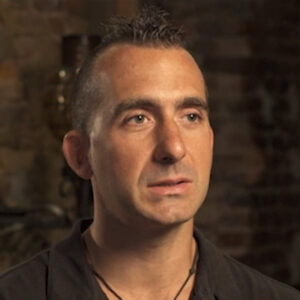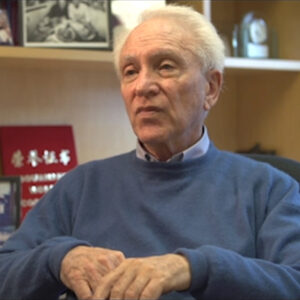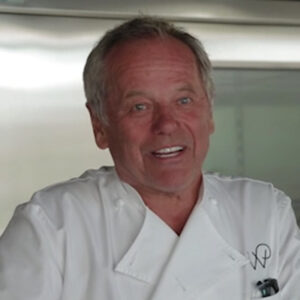Speaker 1 So when you’re you’re when you’re in my line of work, people ask all the time, what are the next big trends in food? And I don’t care. I’m not interested in fads and trends and things. Those are ephemeral. But there’s one trend that I really love. And because it’s more than a trend, and that is the fact that today there are vibrant restaurant scenes in almost every city in the United States, Nashville, Asheville, Hartford, Baltimore, not just New Orleans, not just New York City. Back in the day, you know, even as recently as the 70s, the only beautiful creative cooking that I think was really happening in America was happening in the big cities, the immigrant cities, New York City, New Orleans, San Francisco have long had traditions of great cooking. But much of the rest of the country was really kind of a culinary desert. There wasn’t an interest there. We weren’t educated. We weren’t taught about it. We were taught how to make meatloaf and hamburgers and salmon croquettes. Today, people just got louder. Oh, for fuck’s sake. Let’s just let’s just keep going. I mean,
Speaker 2 that was perfect in what you just said.
Speaker 1 But and that to me is not a trend. That to me is a change in America’s values and a change in the way we look at food. It’s a tectonic shift just in the past 20 years. The average American now knows I mean, I don’t like Yelp. I’m not a fan of it. But what it reflects is that everybody is now wants everybody thinks they’re a critic. Everybody wants to know things about food. Everybody wants blood, orange juice. They want fresh herbs. They want beautiful olive oil. And more and more people know what really is good, whether they’re having a fancy course tasting or whether they’re getting a hoagie. They want it to be good. And that’s how James felt about food, too. And that’s how I feel about food. A great time to be a food lover. Amazing.
Speaker 2 Perfect. Moving right along. The James Beard was born in Portland, Oregon. It’s a boomtown. You want to look at it? Yeah, I’m one of the reasons you have to redo this is because Mitchell referred to Portland as Oregon, like it was a city that was like, OK, so he wasn’t he was let’s do we know
Speaker 1 what year he was born in? Three. Nineteen or three.
Speaker 2 Who was the better? And again, I don’t think you’re going to do it out here, OK?
Speaker 1 OK, let’s do it.
Speaker 2 Basically the gist of that. Sure. Portland at that time with Boomtown, lots of rich, rich timber barons, food. And Jim’s mom was hobnobbing with all of them and dragging him around to great restaurants. And so early on with the food.
Speaker 1 OK, James Beard was born in 1983 in Portland, Oregon, at a time when that city was experiencing a big boom. There were rich timber barons all over the place with socialite wives who loved to eat well, and there were great restaurants all over the city. Meanwhile, James, his mother, was herself a tremendous cook and a bit of a bit of a raconteur. She ran an in and introduced James to great food at a very early age, and she would take James to these fabulous restaurants all over the city. Unfortunately, Prohibition killed many of those restaurants, but at the time he had a he had a terrific palate from a very young age.
Speaker 2 That was pretty much it. No, that’s perfect. And you kind of can combine those two, which is great. Oh, I did love when you said that she was fiercely when all kinds of affairs.
Speaker 1 Oh, yeah, OK. James Beard really picked the right mother for himself because his mom was was quite a character, a terrific cook, a great lover of food. She ran and she was a great she was a terrific cook. A great loves
Speaker 2 can be said for sure. But they have a group that’s fighting right now. Oh, they are a lot quieter, OK.
Speaker 1 James Beard really picked the right mother. His mother was quite a character. She was a great lover of food, a terrific cook introduced. Fuck you, man, quit it out. James Beard really picked the right mother. James, his mother was quite a character. She was a terrific cook. She ran an inn. So she served. She cooked professionally. She introduced James to good cooking at the earliest of ages. And also James was born in nineteen three in Portland, Oregon, at a time when the city was going through a huge boom. The big timber town. The town was just full of these rich timber barons with their socialite wives who really loved to put on fancy clothes and go to great restaurants. And so the city of Portland was full of them. And James, his mother, would take him to those restaurants and introduce him to food. And he had a really great palate at a very young age.
Speaker 2 And then that’s also to the
Speaker 1 left of the affairs.
Speaker 2 And then she was a libertine.
Speaker 1 James Beard really picked the right mother. She was quite a character, a bit of a libertine, very fiercely independent, pretty much married her husband for the express purpose of having James and rather quickly got rid of him and had one affair after the other. She was a libertine. Another kind of person I find immensely impressive and admirable. She was a wonderful cook. She exposed James to great cooking from the earliest of ages, and she took at the time, Portland was a booming timber town full of rich timber barons. And there are socialite wives who love to go to great restaurants, put on fancy clothes and show off. And so there was a great culinary culture in Portland at the time and James got to taste it all. Unfortunately, Prohibition killed that scene as they probably killed all sorts of restaurant scenes in the States, which is why I’m glad we don’t have that anymore. One of several reasons
Speaker 2 that Portland had prohibition even before. Like, we were like one of the first one of the first things
Speaker 1 to lift it or to have it
Speaker 2 happen. So it’s like Portland seeing killed even before any other people. What’s happening? Oh, yes, so that’s all me, man. Oh, yeah, the Onion story.
Speaker 1 Yes, I was about to get to that. I remembered that. Oh, you. OK, so a testament to James’s appreciation of all things food as a very small child, he wrote in one of his books, he recalls crawling into the Onion bin, taking out an onion skin and all and eating the entire thing. I wouldn’t even do that. I love onions. I hope it was a Vidalia or something. That’s awfully hot.
Speaker 2 Yes, that’s great. OK, so the next one is he was described in his obituary as a college dropout, but it’s a little more complicated. Yes. Read. Which is, you know. Oh, yes. But, you know, it is the same Reed as, you know, Redds as what John Reid, John referenced even more than what you read. No, I didn’t see that. It was the only the only American buried at the Kremlin. He is a raging communist. Wow. He is, son. It’s such a great film. Oh, my God. I should see that. Oh, you should totally see it.
Speaker 1 OK, so so in James Fiords obituary in The New York Times, which suffers from several really important omissions, it says that James was kicked out of college. That’s missing. No, it’s I got it. So in James Beardsley, in James Beard’s obituary in The New York Times, it says that he was a college dropout. That’s missing a couple of key points. James went to school at Reed College in Oregon. There’s nothing you can do about that. Oh, he went by quickly. James Beard’s obituary describes him as a college dropout, but that actually misses some really key information. James went to school at Reed College. He was a big man on campus, figuratively, and he was a big man on campus. He was a big man on campus, figuratively and literally. He was interested in the arts. He performed in many plays. He was popular and well known. He was also popular with several of the men with whom he had affairs, other students, at least one professor. This is at a time this was many, many decades before being gay wasn’t a crime. It was actually illegal to be gay. And he was kicked out of Reed College, which is particularly amusing if you look at that city even then and certainly today, a haven for counterculture types. Mr. Reed himself was a raging communist. He was the subject of the movie Reds, if you ever saw that film. But, you know, this was a very, very different time. I mean, he’s lucky he wasn’t thrown in jail. So after he was kicked out of Reed College, James, his mother sent him to Europe to study opera. And it was his dream to be a performer. Didn’t work out in the end as a as a singer, but he certainly became an important teacher and performer in the culinary world. And again, as we’ve discussed and became one of the first people ever to have a food television show in the United States in the 50s, it became one of the first people ever to have an American culinary show in the 40s in the 1940s, when people were wondering if television was even a worthwhile medium, if it was even going to be successful. James was getting endorsement deals from things like Sarasota Flour. I love that commercial. It’s hilarious.
Unidentified And I laughed and I thought this.
Speaker 2 That was great. Thank you.
Speaker 1 Oh, it’s the worst that’s the worst shooting ever. Um.
Speaker 2 Can we can we get the word out and do like when you said, did you say it on this one, James? James was just a little too loud and nobody was sure that, OK,
Speaker 1 your paper is in the way. I’m sorry. James was just a little too out when nobody was out. In fact, being gay was a crime. You would be you could be arrested and sent to prison. You know, the cops raided bar, by the way. The cops were raiding bars. And in the United States in the 60s, the Stonewall riots happened in New York City in nineteen sixty nine. It wasn’t for much longer. And what was until much later? My God, I’m married now. What do you think James Beard would think of that? That gay people can get married in thirty seven American states? By the time this thing airs, I will probably be able to get married and all of them. What do you think James Beard would think about the fact that today gay people can get married? I mean, so so that that actually is the thing about The New York Times obituary that that really bothers me. James Beard had very prominent play in his obituary. When you look at it online, it’s TUPE. It’s a long, thoughtful, decently written obituary that omits any reference to the fact that he was an openly gay person long before a lot of other people were out. That’s an important part of his legacy. It’s not the only part, but it’s an important part. And for that to be omitted from the paper of records obituary of him bothers me a lot. A lot makes me angry. Actually, that’s an important part of his legacy. We deserve we as gay people deserve for the world to know that James was not always vocal about his orientation. He kept quiet about it until I want to say it was in the late 70s in one of his books, he did it occur to him that this was important to talk about. And so he included it in one of his books, even that he was he was a pioneer even then. Well, a little rambling, but, you know, that’s how I roll.
Speaker 2 And you already do the study, which was great. Oh, we talk. Oh yes, we can start that one. OK, yeah. Yeah. Oh, and then the beard. Someone to kind of quickly introduce us to the fact that the great American didn’t really start having great restaurants until really look at the oil. I mean, Lopevi until after the World’s Fair after 30 nine. What’s fair and honest to
Speaker 1 do, I have to talk and say
Speaker 2 that, no, you don’t have to like other people say that. OK, the point is, is that when he went to London, you know, America, even though Paul had great restaurants, it was like the real great restaurants were in Europe, OK? And he got to eat at the Ritz, OK. And this is where you could talk about him being the first. Yes. Yeah.
Speaker 1 OK, so after leaving Reed College, after leaving Reed College, James, his mother sent him to Europe to study opera. And while the restaurants in Portland were terrific, it was Europe that really opened his eyes and his palate to great food. Eating at the Ritz, eating at the great restaurants and on the left bank in Paris just opened a whole new world for him. More than one new world, actually. Also, it’s a it’s also very amusing that at that time, James became a favorite piece of socialites. He was what’s called a walker or what is also often called a beard. That is a well-dressed gay man who is interested in going to parties with fancy women whose husbands probably would much rather stay home and smoke cigars or go to a boxing match. And James was fond of saying that if you have a nice dinner jacket and can talk about art, you can eat really well for very little money. James Beard was the original beard. I love it. I wonder if I mean, is that that could that maybe that’s where the term came from. I actually know what a beard is, is a beard. That’s not what a beard is. That’s not a beard is. We need to take that out. That’s not what a beard is. A beard is. So when a gay man takes a woman around, she’s in pretend she’s the beard. Right.
Speaker 2 But he’s like the reverse beard.
Speaker 1 He’s like the reverse. He’s like, yeah, OK. So so there’s a saying in the gay community that someone who a gay man who carries a gay man who goes to events with a woman to pass her off as a romantic interest, that’s called his beard. So James, in effect, was sort of a reverse beard. He was a gentleman, gentlemanly companion for socialite women in in Paris and London whose husbands didn’t want to go to these parties. James, love going to these parties. He loved the glamour. He loved the food. And going go into these fabulous restaurants like the Ritz and the restaurants on the left bank in Paris really opened a whole new world for him. And as he like to say, you know, if you have a nice dinner jacket and can talk about art, you can eat really well for very little money. True. To this day, by the way.
Speaker 2 That’s perfect. Oh, my God.
Speaker 1 Look at that young guy that hangs out with Calvin Klein. I bet he eats really well. So James and Helen Evans Brown were really close friends, incredibly close. Helen Evans Brown. Helen Evans Brown is Helen Evans. Brown is the writer of the West Coast Cookbook. And she and James were incredibly close friends for years and years and years. They wrote letters daily from nineteen fifty to nineteen sixty two when she died, and I think he saw in her a sort of West Coast mentality that he wasn’t finding around him in New York, which is understandable. Yeah. Oh, you know, I should I should get that, OK? OK, I should get the
Speaker 2 two so that you can pick it up.
Speaker 1 Sure. Um, they wrote letters to one another almost daily from nineteen through nineteen sixty two. And we have those letters and they represent the most true and authentic and we have those letters and they I like this term for it. Oh yes. And those letters were published in a book and they are the true and authentic voice of James Beard. That’s not that’s not what you said. And this book of letters is really that the true and untouched. Yeah. And this Book of letters is such a valuable resource, and it truly this book of letters is the true and untouched version of James Brown’s voice version, Dammit Untouched. This book of letters is the true and untouched voice of James Beard. So let’s take a look at Alice Waters and Chez Panisse. So Alice Waters comes back from France, opens Chez Panisse in 1970 or so. And it’s very common today to go to restaurants where you feel like you’re having dinner at a friend’s house with very fresh food from the farmer’s market. That was not common at all. In 1970, Alice Waters brought back her experience from France, where she saw chefs shopping alongside housewives at the same farmer’s markets, where they have seven kinds of strawberries, seven different varieties of strawberries available to a country where where to a country where the two country where housewives have pretty lousy back to a country where housewives were not did not have access to such beautiful, you know, farm to table kind of fuck. Sorry that she comes back to a culture in the United States that’s nothing like that at all. Where there is there are no farmer’s markets or precious few people are buying. All the food is made by corporations. It’s shrink wrapped. It’s full of processed ingredients. And obviously that’s still very true today, although we fortunately do have farmer’s markets and wonderful produce in places like Whole Foods. But back then, it was a revolution and it was led by revolutionaries. It was the same people that Kate was that were the hippies that started this movement to eat natural food. And an outgrowth of that also is just to explore different cultures and eat different ethnicities, different ethnicities. Cannibalistic, I think also also was an outgrowth of that of that spirit was an interest in the foods of other cultures, which is something that at least my kind of American people from the Deep South were not doing at the time. Very different world today. And so, so, so ironically, in a business that’s completely male dominated, even to this day, the chefs business, it was Alice Waters who really started this revolution and many, many, many, many other contemporaries, Jeremiah Tower, who were the others?
Speaker 2 Jonathan Waxman. And they all worked to change. OK, so that’s the other. Oh, OK. Chefs today were musicians and architects and they all kind of came together. This had become you to start this little restaurant called Japanese.
Speaker 1 So along with Alice Waters, many of the greats, even to this day, Jeremiah Tower, Jonathan Waxman, people who were architects and musicians found their way into this little Alice Waters hippie community sharpness that remains an extraordinarily influential restaurant,
Speaker 2 not too loud,
Speaker 1 which, yes, it was that thing. Now that was too loud, which which remains to say the whole thing. So some some of the greats, even today, a Jeremiah Tower, Jonathan Waxman, who’s cooking about three blocks away from where I’m sitting, cooking beautiful, amazing food, came together into this little hippie commune of Alice Waters and share happiness back in the day. The people who were architects and musicians, not even chefs before came to work with her and be a part of this revolution and look where it’s taking us. It’s unbelievable. So the James Beard was so today to this day, the James Beard Awards are the Academy Awards of the culinary world. There’s not a chef alive that doesn’t desperately want a nomination for a beard award and the opportunity to win it. It changes careers. It changes it can change the arc of a person’s career. This is the big this is this is the Oscar. This is the Tony. This is the Emmy. This is the Grammy all rolled into one, which is a really ironic when you consider that James himself actually had a love hate relationship with the idea of awards and Michelin stars. And he believed and I think he’s there’s some truth to this that you’re devoting yourself to winning prizes could take your attention away from your customers and your own cooking or can change it, can affect your cooking, certainly affects the way people make wine. But be that as it may, the the James Beard Awards are the Academy Awards of the film. The James Beard Awards are the Academy Awards of the culinary world. It was an extraordinary honor for me to be asked to host a couple of years ago. I had a great time. It was really fun. And I know that James. I just know that James would be thrilled to death if he could see this. It is, however, ironic when you consider that James actually had a love hate relationship with the idea of prizes and awards and Michelin stars. He felt that those could distract a chef from his customers and from the cooking and could change the type of cooking that one does. But. What are you going to do? It’s a it’s an interesting night, I will say that the the evening itself of the James Beard Awards is a very interesting night because about eighty five percent of the people walking in the door are going to lose. And they know that and they desperately want it to be them. And who don’t? We all don’t. We all want recognition from our peers, but it can’t. You know why they do. Was nominated for best chef seven times before he won. Finally, he said he deserved it all seven times. It’s an extraordinary night. It’s a night of actually it’s a night of a lot of jitters and a lot of tension. I tried to be funny. It didn’t really work that well. Every chef in there desperately wants a drink and can’t have one, because if there was a bar, they would all be at the bar and I’d be there with them. And it’s a it’s a long but it’s not as long as it used to be. I’ll tell you, they’ve done a great job of tightening it up. It’s very entertaining. It’s very dramatic. It’s a wonderful place to be. I try never to miss it. If they ever forget to ask me if I want a present, I will ask them because I want to be there. I want to see it. It’s a night of the James Beard Awards is a night of watching people’s careers. The arc of their careers change right before your eyes. The minute that medal gets hung around somebody’s neck, it’s a big, big deal. It can change people’s businesses. It can change it can utterly change the arc of somebody’s career. And that to me is thrilling. It’s thrilling.


